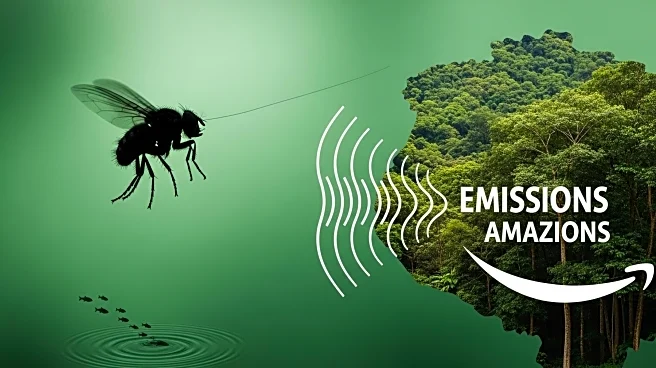What is the story about?
What's Happening?
NPR's science podcast, Short Wave, hosted by Regina Barber and Berly McCoy, delves into three intriguing scientific discoveries. The first story highlights the migration of hoverflies, which are significant pollinators, across the North Sea. These flies, often mistaken for bees, carry pollen from over a hundred plant species, potentially impacting pollination and genetic diversity in distant regions. The second story reveals that trees in the Amazon rainforest have grown larger over the past three decades, likely due to increased carbon dioxide levels from fossil fuel emissions. This growth underscores the Amazon's role in carbon sequestration, although deforestation and climate change pose ongoing threats. Lastly, the podcast discusses the sounds produced by fish in coral reefs, which researchers are using to assess fish populations and reef health. This innovative approach involves underwater microphones and 360-degree video systems to match fish sounds with visual images.
Why It's Important?
These scientific findings have significant implications for environmental conservation and climate change mitigation. The hoverfly migration study suggests that these insects could play a crucial role in enhancing plant resilience to climate change by introducing new genetic material. The Amazon rainforest's growth highlights its vital function in absorbing carbon dioxide, emphasizing the need for conservation efforts to prevent deforestation and maintain its ecological services. Understanding fish sounds offers a non-invasive method to monitor reef health, which is critical for preserving marine biodiversity. These insights contribute to broader efforts to address climate change, protect ecosystems, and ensure sustainable environmental practices.
What's Next?
Future research will focus on whether the pollen carried by hoverflies can successfully pollinate plants after long-distance travel. In the Amazon, scientists will continue to monitor tree growth and assess the forest's ability to withstand climate-related stressors like drought and wildfires. The development of more accurate systems to match fish sounds with visual data will enhance marine biologists' ability to study fish populations and reef health. These studies will inform conservation strategies and policies aimed at mitigating climate change impacts and preserving biodiversity.
Beyond the Headlines
The findings on hoverfly migration and Amazon tree growth highlight the complex interplay between human activities and natural ecosystems. The potential for hoverflies to introduce new genes to plants raises questions about the long-term effects on plant evolution and adaptation. The Amazon's growth, while positive, does not negate the urgent need to address deforestation and climate change. The use of fish sounds as a monitoring tool reflects a shift towards less intrusive methods in ecological research, which could lead to more sustainable practices in marine conservation.
















